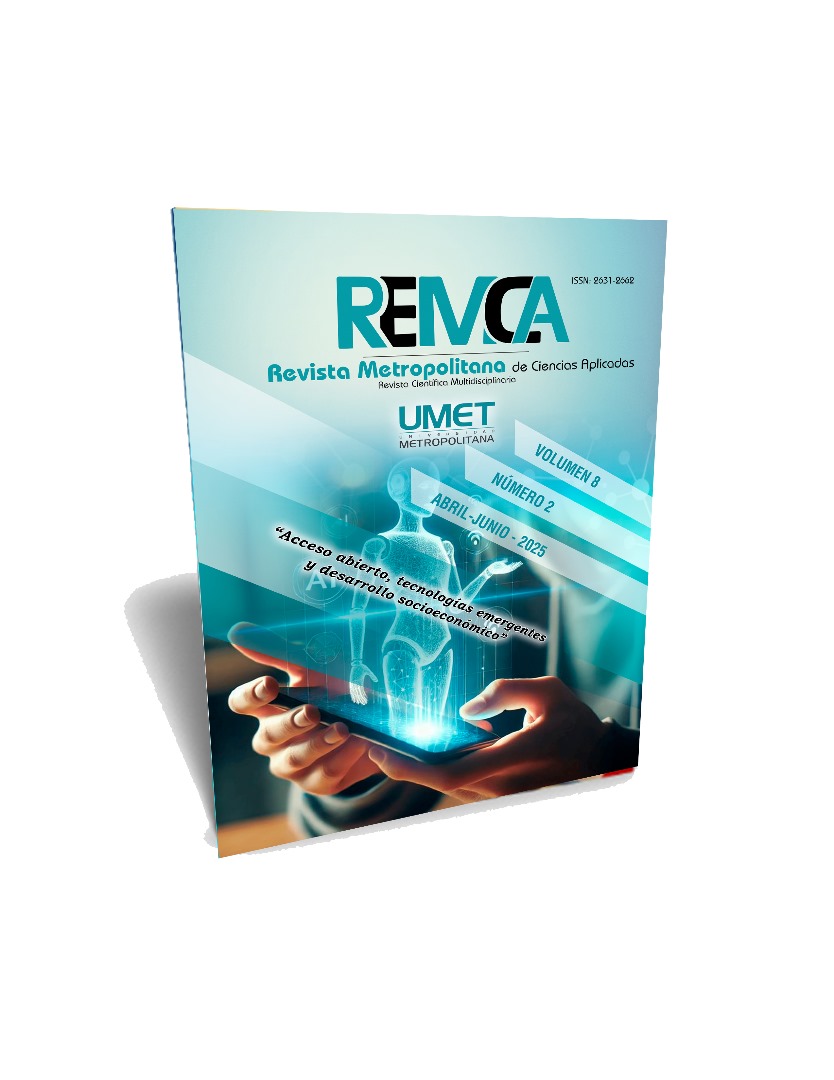Analítica del aprendizaje en el diagnóstico de los saberes digitales de los docentes de secundaria de la Unidad Educativa del Milenio Bernardo Valdivieso
DOI:
https://doi.org/10.62452/wqharh93Keywords:
Information and Communication Technologies, , teaching-learning process, digital knowledgeAbstract
The digital transformation has turned ICTs into key tools for improving teaching. However, a diagnostic study at the Bernardo Valdivieso Educational Unit in Loja revealed limitations in the digital knowledge of secondary school teachers, affecting technological integration in the classroom. This study seeks to diagnose these competencies through learning analytics to strengthen their use in teaching. The instrument was structured with 89 items for a sample of 50 teachers, assessing four dimensions: digital systems management, content manipulation, communication and socialization in digital environments, and information management. The instrument's validity was confirmed with Aiken's V (0.82) and its reliability with Cronbach's alpha (0.85). Además, entrevistas a autoridades educativas permitieron contextualizar los desafíos en la integración de TIC. Los resultados revelaron que los docentes de Historia presentan mayores deficiencias, especialmente en el uso de dispositivos, administración de archivos y creación de contenido, mientras que los de Matemáticas y Química tienen mejor manejo tecnológico. También se identificó una brecha en comunicación y colaboración digital, limitando el aprendizaje interactivo. Para reducir estas carencias, se diseñó un Plan de Mejora con cinco módulos enfocados en competencias digitales, metodologías activas y evaluación continua. Su implementación facilitará la reducción de brechas digitales, optimizará la enseñanza con tecnología y fomentará un aprendizaje seguro y ético en entornos digitales, promoviendo la innovación educativa.
Downloads
References
Buckingham, D. (2005). Educación en medios: alfabetización, aprendizaje y cultura contemporánea. Ediciones Paidós.
Buendía, E., Bravo, C., & Hernández, P. (1998). Métodos de Investigación en Psicopedagogía. McGraw-Hil.
Delgado Cisneros, V. J., & Cantú Valadez, M. (2016). Saberes informáticos e informacionales en un grupo de docentes de secundaria en una institución pública en Colombia. EDUTEC. Revista Electrónica de Tecnología Educativa, (56). https://www.edutec.es/revista/index.php/edutec-e/article/view/674/Edutec_n56_Delgado_Cantu
Erstad, O. (2010). Educating the digital generation. Nordic Journal of Digital Literacy, 5(1), 56–70.
Eshet-Alkalai, Y. (2014). Digital Literacy: A Conceptual Framework for Survival Skills in the Digital Age. Journal of Educational Multimedia and Hypermedia, 13(1), 93–106. https://www.uwyo.edu/wsup/_files/docs/transitions/english/combined_2016/digital_literacy_yoram_eshet-alkalai.pdf
Ferguson, R. (2012). (2012). Learning analytics: drivers, developments and challenges. International Journal of Technology Enhanced Learning, 4(5/6), 304–317. https://doi.org/10.1504/IJTEL.2012.051816
Gašević, D., Dawson, S. & Siemens, G. (2015). Let’s not forget: Learning analytics are about learning. Techtrends Tech Trends, 59, 64–71. https://doi.org/10.1007/s11528-014-0822-x
Ifenthaler, D., & Yau, J. (2020). Utilización de la analítica del aprendizaje para impulsar el éxito académico en la educación superior: una revisión sistemática. Education Tech Research Dev., 68 , 1961-1990. https://doi.org/10.1007/s11423-020-09788-z
Jenkins, H., Purushotma, R., Weigel, M., Clinton, K., & Robison, A. (2009). Confronting the Challenges of Participatory Culture. The MIT Press
Lara-Rivera, J., & Cabero-Almenara, J. (2021). Saberes digitales en el profesorado universitario: Estudio en una escuela mexicana. RED. Revista de Educación a Distancia, 21(66). https://doi.org/10.6018/red.447911
Long, P., & Siemens, G. (2011). Penetrating the Fog: Analytics in Learning and Education. https://er.educause.edu/articles/2011/9/penetrating-the-fog-analytics-in-learning-and-education
López Fernández, R., Sánchez Gálvez, S., Quintana Álvarez, M. R., & Gómez Rodríguez, V. G. (2023). Valoraciones teóricas sobre el concepto de analítica del aprendizaje. Mendive. Revista De Educación, 22(1). https://mendive.upr.edu.cu/index.php/MendiveUPR/article/view/3699
Prensky, M. (2015). Digital Natives, Digital Immigrants. https://www.marcprensky.com/writing/Prensky%20-%20Digital%20Natives,%20Digital%20Immigrants%20-%20Part1.pdf
Ramírez Martinell, A., & Casillas, M. (2021). Saberes digitales en la educacion: Una investigacion sobre el capital tecnologico incorporado de los agentes de la educacion. Editorial Brujas.
Ruipérez-Valiente, J. A. (2020). Learning Analytics: Fundamentos y aplicaciones en el aprendizaje digital. Editorial Síntesis
Selwyn, N. (2010). Degrees of Digital Division: Reconsidering Digital Inequalities and Contemporary Higher Education RUSC. Universities and Knowledge Society Journal, 7(1), 33-42. https://www.redalyc.org/pdf/780/78012953011.pdf
Tsai, Y., & Gasevic, D. (2017). Learning analytics in higher education --- challenges and policies: a review of eight learning analytics policies. (Ponencia). 17: Proceedings of the Seventh International Learning Analytics & Knowledge Conference. Vancouver, Canada.
West, D., Heath, D., & Huijser, H. (2016). Let’s Talk Learning Analytics: A Framework for Implementation in Relation to Student Retention. Online Learning, 20(2). https://doi.org/10.24059/olj.v20i2.792
Downloads
Published
Issue
Section
License
Copyright (c) 2025 María Guillermina Guerrero-Tandazo, José Luis Romero-Torres, Ennio Jesús Mérida-Córdova (Autor/a)

This work is licensed under a Creative Commons Attribution-NonCommercial-ShareAlike 4.0 International License.
Authors who publish in Revista Metropolitana de Ciencias Aplicadas (REMCA), agree to the following terms:
1. Copyright
Authors retain unrestricted copyright to their work. Authors grant the journal the right of first publication. To this end, they assign the journal non-exclusive exploitation rights (reproduction, distribution, public communication, and transformation). Authors may enter into additional agreements for the non-exclusive distribution of the version of the work published in the journal, provided that acknowledgment of its initial publication in this journal is given.
© The authors.
2. License
The articles are published in the journal under the Creative Commons Attribution-NonCommercial-ShareAlike 4.0 International License (CC BY-NC-SA 4.0). The terms can be found at: https://creativecommons.org/licenses/by-nc-sa/4.0/deed.en
This license allows:
- Sharing: Copying and redistributing the material in any medium or format.
- Adapting: Remixing, transforming, and building upon the material.
Under the following terms:
- Attribution: You must give appropriate credit, provide a link to the license, and indicate if any changes were made. You may do this in any reasonable manner, but not in any way that suggests the licensor endorses or sponsors your use.
- NonCommercial: You may not use the material for commercial purposes.
- ShareAlike: If you remix, transform, or build upon the material, you must distribute your creation under the same license as the original work.
There are no additional restrictions. You may not apply legal terms or technological measures that legally restrict others from doing anything the license permits.




